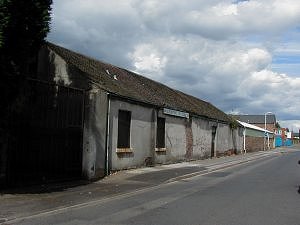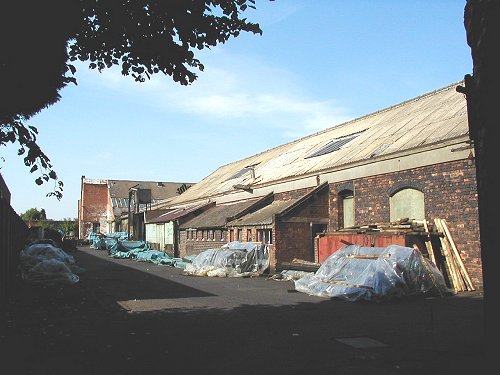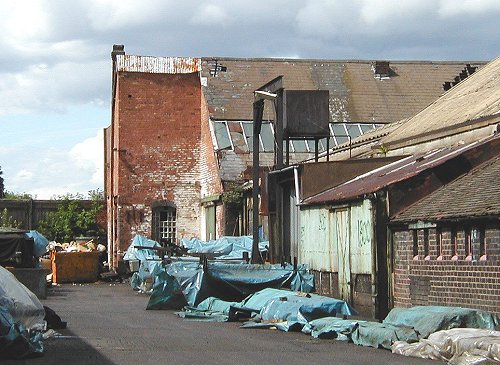|
In the construction of the New
Griffin Works, many features of improvement in
design and arrangement would be suggested by the
long practical experience of the proprietors, and in
our progress through several departments, frequent
evidences of this progressive adaptation of modern
appliances and methods came under our notice.
The new works occupy a most
convenient site in Willenhall Road, covering upwards
of four acres, bounded by the Birmingham Canal on
one side, and close to the Wolverhampton and Walsall
section of the Midland Railway Company. The premises
comprise, in the front portion, handsomely appointed
general and private offices, adjacent to which are
store rooms and the entrance to the large open
quadrangle, round which are ranged the various
substantial buildings devoted to the manufacturing
departments.
|

New Griffin Works. |
On the right and left of the
entrance are four large forging shops,
each fitted with a number of smith’s
hearths furnished with steam blowing
apparatus on an entirely new principle,
one portion of the forges being utilised
for the manufacture of horse shoes.
The firm are the original and only
makers of the ‘Best Crown’ brand, a
speciality largely supplied to her
majesty’s government. |
Other brands as shown by the
accompanying Trade Marks are widely known and
esteemed in the home and foreign markets. Spades and
shovels are also one of the special features at
these works.
At the further end of the yard
are the forging shops in which heavier steam hammers
are placed, some weighing nearly four tons. To bear
this immense weight and consequent concussion, the
floor of these shops has been specially prepared
upon a foundation of some eight or ten feet of
massive logs of timber, concreted on the top.

Another view of the works.
The engines used in driving the
machinery are of exceptional size and power, and are
fitted with immense flywheels, one of the engines
being served by three enormous boilers, each of 37
feet long.
At the entrance end of the
premises are the grinding and polishing shops,
similar in arrangement to those already described in
the old works (Griffin Works, Horseley Fields). At
both establishments extensive space is allotted to
the warehousing and packing of the firm’s finished
goods, to which our attention is next directed.
Literally speaking Messrs.
Edwards and Son’s manufactures can claim world-wide
utility and favouritism in their many sided
application to the arts of cultivation. Railway and
road-making, and mining and woodcraft operations,
for which they are exclusively designed. Without
entering upon a fully detailed description of the
numerous range of articles of their production, we
may present particulars of the more representative
types of edge tools, which offer special features of
interest to the trade. In implements of cultivation
there are, perhaps most widely known as the
inventors and makers of the ‘Royal Express’ hoe,
which has almost entirely superseded the old
‘Brazil’ iron hoe, with its shoulders more than half
an inch thick, and its blade 11 inches wide.

The rear building that
overlooks the canal.
The firm also make an improved
type of wrought-iron wheel barrow, with steel bodies
constructed in parts, which are put-up in handy form
for packing for the export markets, that they may be
easily put together again when landed at their
destination.
Messrs. Edwards & Son have long
since met with justly merited recognition at some of
the principal industrial exhibitions of the century,
their record including the award of a first class
certificate and silver medal for their edge tools,
spades, shovels, hoes, and horse shoes at Calcutta,
1883-84. Two first class certificates and highest
awards at Liverpool International Exhibition, 1886,
while their handsome and attractive stand at the
more recent Wolverhampton Fine Arts and Industrial
Exhibition obtained the highest award in its own
particular section. |